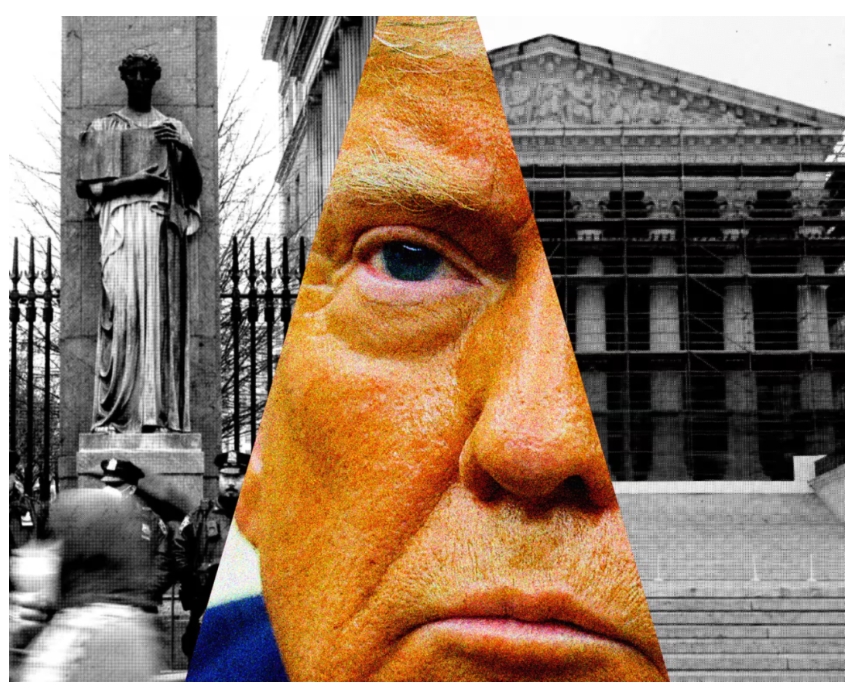
The Program
This four-day program offers an in-depth exploration of how American political institutions function in practice, with a central focus on the separation of powers. While the U.S. Constitution assigns distinct roles to Congress, the presidency, and the courts, the actual dynamics of governance are shaped by conflict, strategic adaptation, and institutional change. Through a series of thematic lectures and interactive discussions, we will examine how power is shared, contested, and reshaped across branches of government—and what this means for democratic accountability, policymaking, and institutional resilience in the United States and beyond.

01 Competing Powers, Shared Government
Topic: The Logic of Separation of Powers and Its Tensions
This session introduces the separation of powers as both a constitutional principle and a governing dilemma. We explore how the design of shared authority between the branches creates both friction and flexibility, driving institutional conflict, compromise, and innovation. Case studies will highlight how political actors manipulate institutional rules to shift the balance of power.

02 Congress and the Struggle for Relevance
Topic: Lawmaking, Oversight, and Institutional Decline
Focusing on Congress, this session examines how electoral incentives, party polarization, and internal procedural dynamics have reshaped the legislative branch’s role in governance. We will consider how Congress has struggled to maintain oversight, how its lawmaking capacity has changed over time, and how its position has been challenged by growing executive and bureaucratic power.

03 The Presidency and the Politics of Unilateralism
Topic: Executive Ambition in a System of Constraints
This session investigates how modern presidents attempt to achieve policy goals in an environment designed to limit unilateral authority. We explore the use of executive orders, administrative appointments, emergency declarations, and agency control, as well as how crises—from war to public health—can expand or test the boundaries of presidential power.

04 Courts, Bureaucracy, and the Shadow Separation of Powers
Topic: Judicial Power, Administrative Governance, and the Limits of Control
The final session focuses on two key players often overlooked in discussions of separation of powers: the federal courts and the bureaucracy. We will analyze how courts interpret and enforce the boundaries between branches, and how the administrative state exercises power—often insulated from direct political control. We’ll also examine contemporary debates over judicial legitimacy and the future of regulatory governance.

The Speaker

Christina Kinane
Assistant Professor of Political Science, Yale University
Christina Kinane is an Assistant Professor of Political Science, a Resident Fellow in the Institution of Social and Policy Studies, and the Faculty Director of the Millstone Fellowship in Public Service at Yale University. She studies American political institutions and their role in policymaking under separation of powers, with a focus on the political control of the bureaucracy. Her work has been published in the American Political Science Review and Presidential Studies Quarterly. She received her Ph.D. in Political Science from the University of Michigan in 2019, and an M.P.A. in Public and Economic Policy from the London School of Economics and B.A.'s in Political Science and Economics from UCLA.
Event Time
China Standard Time:
- Thursday, May 22; Friday, May 23; Thursday, May 29; Friday, May 30
- 20:00 - 21:30
The Format
Participation Format

*Please download and install the Zoom Application beforehand. Yale Center Beijing’s staff will contact confirmed participants for further testing in advance of the program to ensure a pleasant experience.
Language
The language of the program will be English.
- Four 90-minute lecture and discussion sessions (a total of 6 hours) over 2 weeks
Optional Task
Participants may choose to submit either an English essay related to American political institutions or a two- to five-minute video presentaion. Yale Center Beijing will select a number of outstanding submissions for awards. Further details will be announced in due course.
In addition, participants who attend all sessions will receive a Certificate of Attendance.
Registration
Participants:
- Middle / high school / university students and anyone who is interested in politics and international relations (recommendation: be at least 14 years old)
- English language proficiency for meaningful participation during discussions
Optional Question:
- One “fast take” response about why this program interests you (in English, 140 characters or under)
- Yale Center Beijing will select 3 best submissions and award each with a Yale Center Beijing mug.
* Registration is subject to approval.
Fee:
- Early Bird (by April 27): RMB 3,999 (Includes a Yale Center Beijing T-shirt with registration)
- May Day Discount (by May 5): RMB 4,200
- Standard Ticket: RMB 6,000
- Participants of past Yale Center Beijing programs, those who have paid in advance for the 'For Humanity' Lecture Series, and Group Registrations (at least five persons) Special Discount: RMB 3,899 per person
*The registration fee for the event is non-refundable. Unless due to a force majeure reason, Yale Center Beijing will not refund any part of the registration fee if a participant fails to attend the event.
Contact:
Please send an email to [email protected], or reach out to the Yale Center Beijing Team for inquiries:
WeChat ID: Yalecenterbeijing
Cellphone: +86 13810559940
(Monday to Friday, 9:00 - 18:00 )
Registration:
To apply, scan the QR code below, or click HERE.

Experience Yale Program Series
Yale Center Beijing has held Yale faculty-led multi-day programs over the years for next generation leaders and lifelong learners to engage in intellectual exchanges with peers and Yale faculty, discover new passions, and be immersed in critical thinking, evidence-based discussions, and collaborative activities.
Public Event
